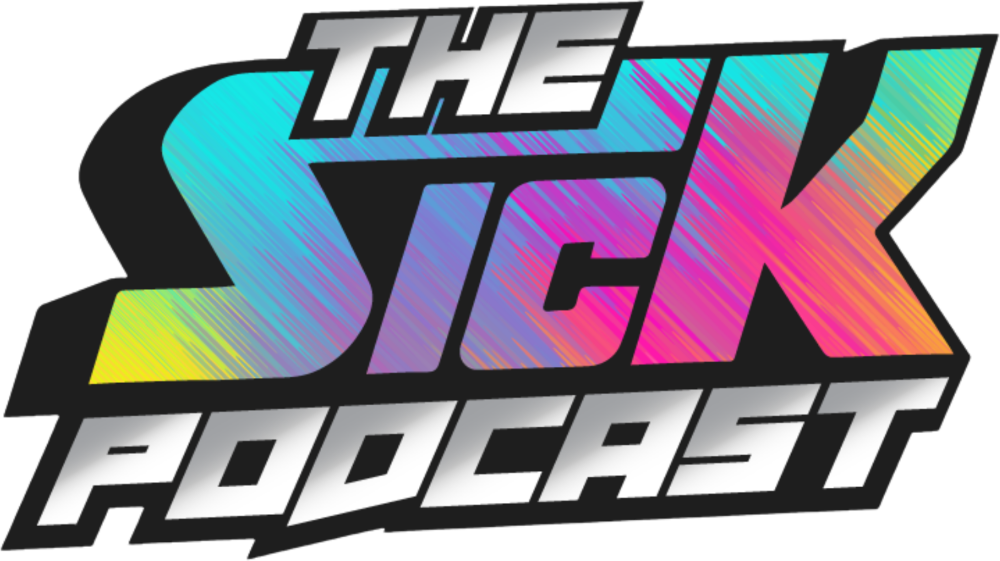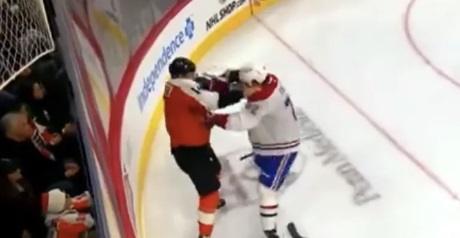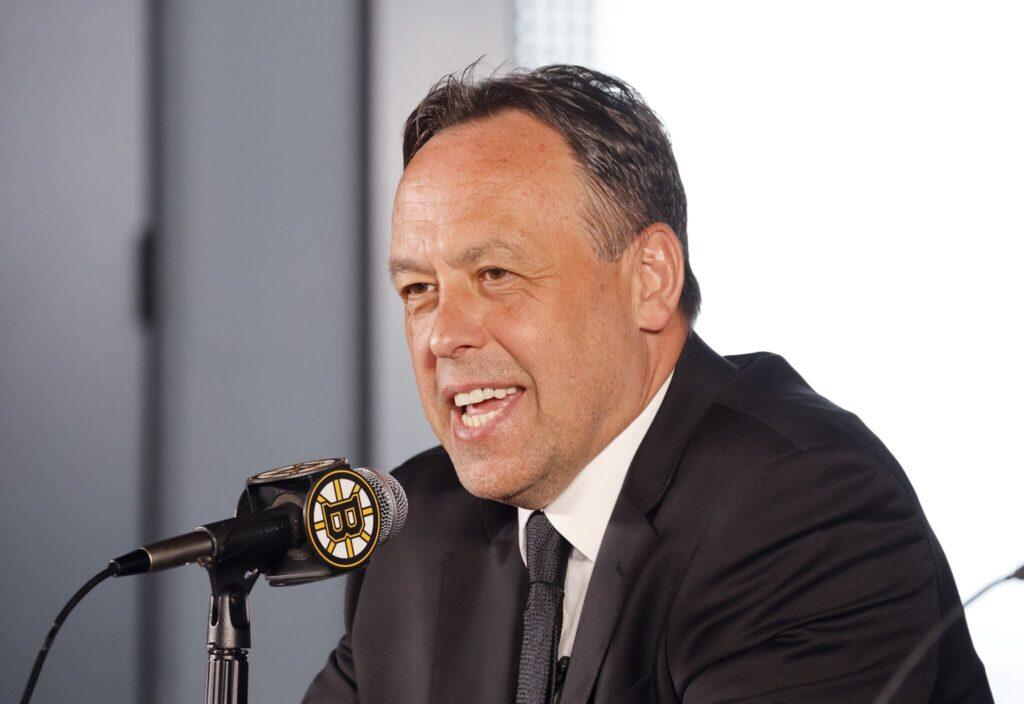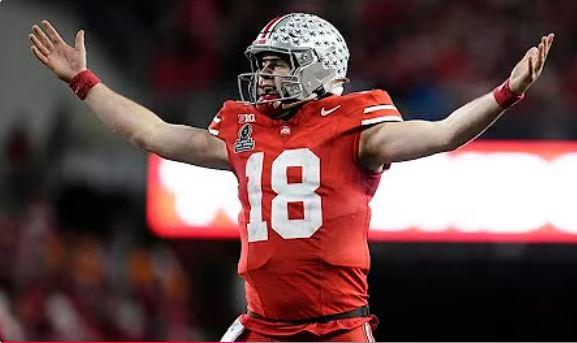No, the referee isn’t out to get your favourite team. Maybe they were just bad at their job that day. Officials are human and because of that, are going to make mistakes. But sometimes, those mistakes are glaring and obvious leaving everyone to wonder how that wasn’t corrected on the spot by the other officials on the ice.
The NHL owes it to not just the fans, but also the coaches and players to modernize their approach to officiating and provide public accountability for their officials. One look at the Montreal Canadiens vs Philadelphia Flyers game on 27 October gives a glaring example where everyone watching was left with a collective WTF moment on a call that was made.
The Call Causing Questions
Nick Seeler bolted from the neutral zone to grab Arber Xhekaj from behind as he was squaring up with Sean Couturier (who was stepping up for his hit – which wasn’t dirty BTW), both dropped gloves to start the altercation before Seeler arrived, which would normally be an immediate third man in call and a game misconduct for the Flyers defender. Yet, somehow only Xhekaj gets a penalty (unsportsmanlike conduct) while ignoring the fact a fight had started, or that Seeler was a third man in on that play.
Mais quelle séquence étrange ! Qu'en pensez-vous ? pic.twitter.com/jwGuk1kP4g
— RDS (@RDSca) October 28, 2024
Fans quickly criticized the officials, questioning why Xhekaj, who appeared to follow the rules by waiting for Couturier to engage, was the only player penalized. Former NHL player, and current NHL analyst on RDS, PJ Stock commented on the play. He brings up a valid point, what if this happened in April, or worse, the playoffs? A call like that could easily directly impact the outcome of a game that could lead to one team being eliminated.
NHL is completely wrong on the call in the Canadiens Flyers game. Terrible call. Two Flyers drop their gloves. 1 Canadien. 1 penalty to Montreal. This is where NY has to jump in. It’s hockey in October. Fine. Imagine this happened in April.
— PJ Stock (@PJStock28) October 27, 2024
This is a call that seems to have been made based on reputation. Xhekaj is a known fighter, Couturier is not, and even though his hit on Kirby Dach on that play was not malicious, and legal, he was going to step up to answer the call of the unwritten code. But what Seeler did, does not fit that code.
Where’s the Accountability?
There is no explanation as to why the call was made the way they made it. The NHL has never been a league that has provided answers to questions like that, instead, they simply shut down any criticism of the officials and defend them at all costs. The only time the NHL cut bait with a referee was when Tim Peel was caught on a hot mic saying: “It wasn’t much, but I wanted to get a f—ing penalty against Nashville early.” The NHL determined that voice was Peel’s and said that the ref would “no longer be working NHL games now or in the future.” Basically, admitting that as long as everyone keeps their mouths shut, they don’t have to be held accountable
After any game with a contested or confusing call, the coaches and players are asked their thoughts on that event. Obviously, if their team gained a power play, they’d keep quiet, and if they were put shorthanded, they’d dislike the decision. But for the sake of transparency, perhaps access needs to be given to the officials so that they can provide context to a specific call. At the very least, some kind of media release from the NHL explaining the call, beyond just stating “We have the best officials in sport”.
"Let's be Clear! Our officials are not the best hockey officials in the world, the are the best officials in any sport." 😳
Gary Bettman lives on another planet! pic.twitter.com/hMfZx9LbzS— JeSuisCH🏒BleuBlancRouge (@HabsHappy) July 8, 2021
Placing a referee in a media spotlight with a microphone and being made to answer for their decisions may feel like justice to the fans of the sport. Yet, that isn’t something that would improve the sport or the officiating. Instead, these officials would then go into games trying not to be controversial, missing calls or making poor ones to even things up to avoid the spotlight.
The NFL uses a grading system to hold referees accountable. Just as most good teams make the playoffs and bad teams don’t, the same goes for NFL referees. The highest-graded officials are rewarded by working postseason games. Those who have had subpar performances do not make the grade to officiate any playoff games when it matters most. Some officials whose performance is graded as sub-par can be subject to suspension, a demotion or even fired. The NHL already has this type of system in place, and it just doesn’t seem to be enough.
The NHL doesn’t like to be compared to the NBA, but in many aspects, they are similar, and this issue is an area that hockey can learn from basketball. Namely, an approach to accountability for their officiating. While imperfect, the NBA’s “last two minutes” accountability page provides explanations for every call without the need to put their officials in front of the microphone to answer questions. With the smaller list of infractions called in an NHL game, the league could provide a similar accounting for each call made.
This wouldn’t involve the challenge calls, or video-reviewed calls as those were already explained on the ice. It provides NHL officiating crews the accountability without the exposure of media scrutiny. While this will never fully satisfy every fan, by providing more insight, the fog of misunderstanding can be lifted, and the fans, players and coaches alike would have better insight into how each official calls a game.
Slow-motion replays and ultra-high-definition TV give fans the illusion that they can do the job of an NHL official. But that is simply not true. They have to make calls on the spot in real-time. They don’t have the luxury of replays and slow motion. That doesn’t mean they shouldn’t be held accountable for highly questionable decisions. As professionals, they should be confident enough to explain their rationale for their calls on the ice and should also welcome a system that allows them to provide clarification for their decisions, which could alleviate a lot of the scrutiny and pressure they face from the fans at home.






